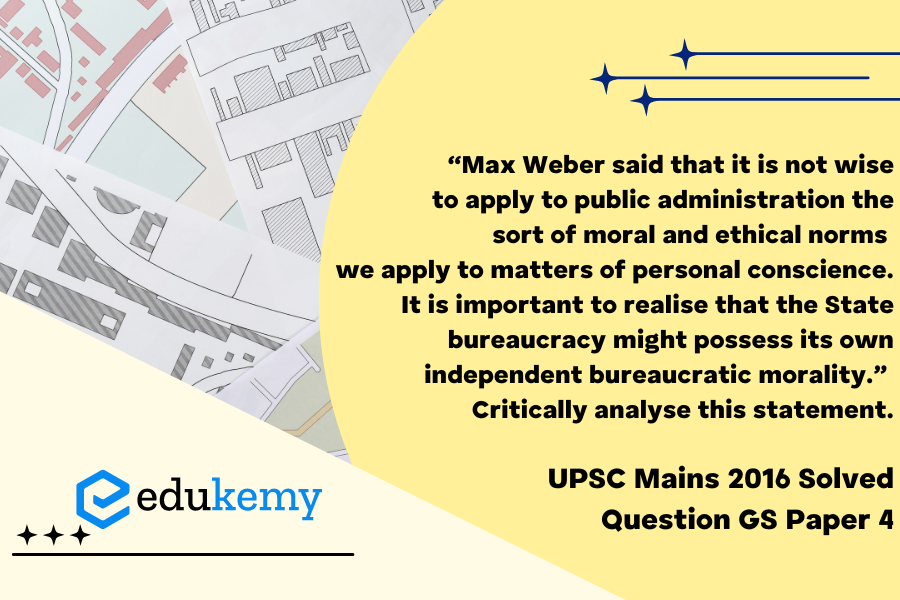Max Weber’s assertion regarding the application of moral and ethical norms to public administration underscores a fundamental distinction between personal conscience and state bureaucracy. Weber argues against the imprudent transposition of individual moral standards onto the realm of public administration. According to him, the state bureaucracy operates within a unique framework, possessing its own independent bureaucratic morality. This perspective challenges the conventional assumption that ethical considerations applicable to personal conduct seamlessly extend to the machinery of the state. Critically analyzing Weber’s statement requires an examination of the implications on governance and societal values. While acknowledging the necessity of ethical guidelines in public administration, Weber’s stance prompts reflection on the pragmatic complexities of bureaucratic functioning. A nuanced assessment must consider the potential ramifications of a distinct bureaucratic morality on accountability, transparency, and the relationship between the state and its citizens. Thus, Weber’s insight necessitates a careful evaluation of the interplay between individual ethics and bureaucratic imperatives within the context of public administration.
Tag: Public/Civil service values and Ethics in Public administration.
Contents
Decoding the Question:
- In the Introduction, try to write a background or brief introduction about Max Weber and his model on Bureaucracy.
- In Body, highlight Weber’s Bureaucracy. In next part draw attention upon Merits and Demerits of Weberian Model of Bureaucracy
- In Conclusion, try to highlight the importance of Weber’s Model.
Answer:
According to Weber, there is a popular perception that the public experiences a sense of personal frustrations in its dealing with state bureaucracy. However, such frustration is a by-product of the achievement of other objectives that the public also values highly such as desire to ensure fairness, justice and equality in treatment of citizens – a crucial qualitative feature of modern government that is largely taken for granted. He was one of the towering thinkers of the twentieth century. The Weberian ideal type bureaucracy continues to be the dominant paradigm in the public administration.

Merits of the Weberian Model of Bureaucracy:
- Impersonal Order: Weber emphasized that the official should perform their duties in an impersonal manner.
- Rules: Rules are the basis for the functioning of the legal-rational authority. Adherence to rules originally conceived as a means, becomes an end in itself.
- Sphere of Competence: It involves a sphere of obligation to perform functions, which have been marked off as a part of a systematic division of labour.
- Hierarchy: According to Weber every office and every official is a part of a hierarchy. He attaches greater importance to the principle of hierarchy in the organisation of office.
- Separation of Personal and Public Ends: Weber pleads for separation of officials from their ownership of the means of administration. The office property is separated from personal property; at the same time the official is accountable for the use of office property.
- Written Documents: Written documents are the heart of Weberian bureaucracy.
- Monocratic Type: It means certain functions performed by bureaucracy cannot be performed by any other organization. They monopolize certain functions and only the authorized official can perform that function, making them monochromatic in nature.
Thus, Weber believed that rational bureaucracy is technically superior and capable of attaining a high degree of efficiency.
Demerits of Weberian Model of Bureaucracy: However, this idea that bureaucracy might be a substantive ethical domain in its own right has been criticized as being inherently unethical. This one sided rationality sustains itself through repressing and marginalizing of values. This results in the bureaucracy developing into an elite class at the cost of other sections of the society.
Despite criticism from several scholars, the ideas of Weber on bureaucracy continue to be relevant to understanding the present administrative system. So far, there is no alternative model to Weber’s bureaucracy. Weber is right in saying that when people are accustomed to the bureaucracy, they cannot think of any other alternative. It is highly useful for managing large-scale organizations. His ideas on the selection of officials based on qualifications, the utility of written documents in administration, hierarchy, etc., can be seen in any administration of the present day.
In case you still have your doubts, contact us on 9811333901.
For UPSC Prelims Resources, Click here
For Daily Updates and Study Material:
Join our Telegram Channel – Edukemy for IAS
- 1. Learn through Videos – here
- 2. Be Exam Ready by Practicing Daily MCQs – here
- 3. Daily Newsletter – Get all your Current Affairs Covered – here
- 4. Mains Answer Writing Practice – here


